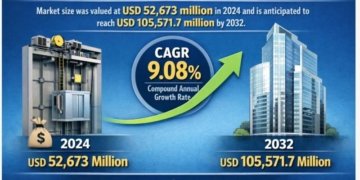The global water leakage detector systems market is valued at USD 5.2 billion in 2025. As per Fact.MR analysis, the market will grow at a CAGR of 5.8% and reach USD 9.3 billion by 2035.The global water leakage detector systems market is experiencing robust growth, fueled by the increasing incidence of water leaks and the subsequent demand for efficient detection technologies. These systems range from basic sensors that detect moisture to advanced IoT-enabled devices that provide real-time monitoring and alerts. The market caters to diverse sectors, including residential buildings, commercial properties, data centers, healthcare facilities, and industrial plants. The growing adoption of smart home technologies and the integration of artificial intelligence (AI) and machine learning (ML) in leak detection systems are further propelling market expansion.
The market’s growth is also supported by the rising costs of water damage. In the United States alone, water damage claims account for billions of dollars annually, with leaks in plumbing systems being a primary culprit. As a result, insurance companies and property owners are increasingly investing in preventive measures like water leakage detectors to minimize risks. Additionally, stringent government regulations aimed at water conservation and infrastructure protection are encouraging the adoption of these systems in both developed and developing regions.
For More Insights into the Market, Request a Sample of this Report:https://www.factmr.com/connectus/sample?flag=S&rep_id=7960
Key Drivers
Several factors are driving the growth of the water leakage detector systems market. First, the global focus on water conservation is a significant catalyst. With water scarcity becoming a pressing issue in many regions, governments and organizations are prioritizing technologies that reduce water wastage. Leak detection systems play a pivotal role in this effort by identifying leaks early, thereby preventing substantial water loss.
Second, the rise of smart buildings and IoT technologies is transforming the market. Modern water leakage detectors are equipped with wireless connectivity, allowing them to integrate with smart home systems and building management systems (BMS). These devices can send real-time alerts to smartphones or centralized control systems, enabling swift action to mitigate leaks. The integration of AI and ML further enhances the accuracy of these systems by predicting potential leak points based on usage patterns and environmental factors.
Third, the increasing cost of water damage repairs is pushing property owners and facility managers to invest in preventive solutions. In commercial settings, such as hotels, hospitals, and data centers, even minor leaks can lead to significant operational disruptions and financial losses. Water leakage detectors provide a cost-effective way to monitor critical areas and prevent costly damages.
Market Trends
The water leakage detector systems market is witnessing several notable trends. One prominent trend is the shift toward wireless and IoT-based systems. These devices offer greater flexibility in installation and monitoring, making them suitable for both new constructions and retrofitting existing buildings. The ability to connect with cloud platforms and mobile apps has made these systems more user-friendly and accessible to a broader audience.
Another trend is the growing demand for multi-sensor systems. These advanced detectors combine water leak detection with other environmental monitoring functions, such as temperature, humidity, and pressure sensing. This multifunctionality enhances the overall efficiency of building management systems and provides comprehensive protection against environmental risks.
The market is also seeing increased adoption in emerging economies. Rapid urbanization, coupled with aging infrastructure in countries like India, China, and Brazil, is driving the need for reliable leak detection solutions. Governments in these regions are implementing policies to promote water conservation, further boosting market demand.
Challenges
Despite its promising growth, the water leakage detector systems market faces several challenges. High initial costs associated with advanced systems, particularly IoT-enabled devices, can deter adoption, especially in price-sensitive markets. Small-scale property owners and businesses may find it challenging to justify the upfront investment, even though these systems offer long-term savings.
Another challenge is the lack of awareness in certain regions. In some developing countries, the benefits of water leakage detectors are not widely understood, leading to slower adoption rates. Additionally, the maintenance and calibration of advanced systems require technical expertise, which may not be readily available in all markets.
False alarms and sensor inaccuracies can also undermine user confidence. While modern systems have improved significantly, environmental factors like humidity or temperature fluctuations can sometimes trigger false positives, leading to unnecessary interventions.
Opportunities
The water leakage detector systems market presents numerous opportunities for growth and innovation. The increasing adoption of smart city initiatives offers a significant opportunity for market players. As cities worldwide invest in intelligent infrastructure, the demand for integrated leak detection systems is expected to rise. These systems can be incorporated into broader smart water management networks to optimize water usage and reduce wastage.
Advancements in sensor technology and AI are opening new avenues for product development. Next-generation detectors with enhanced sensitivity and predictive capabilities are likely to gain traction, particularly in high-risk environments like data centers and healthcare facilities. Additionally, partnerships between technology providers and insurance companies could drive market penetration by offering incentives for installing leak detection systems.
The growing emphasis on sustainability also presents opportunities for market expansion. Companies that develop eco-friendly and energy-efficient detectors are likely to attract environmentally conscious consumers and businesses. Furthermore, the expansion of e-commerce platforms is making these systems more accessible to a global audience, facilitating market growth in remote and underserved regions.
Regional Insights
The water leakage detector systems market is geographically diverse, with North America and Europe currently leading in terms of market share. In North America, the high prevalence of water damage claims and the widespread adoption of smart home technologies are key growth drivers. Europe, on the other hand, benefits from stringent regulations on water conservation and building safety standards.
Asia-Pacific is expected to witness the fastest growth in the coming years, driven by rapid urbanization, infrastructure development, and increasing awareness of water conservation. Countries like China and India are investing heavily in smart city projects, creating a favorable environment for market expansion. The Middle East and Africa, while currently smaller markets, are also showing potential due to water scarcity concerns and government-led initiatives.
Get Customization on this Report for Specific Research Solutions :https://www.factmr.com/connectus/sample?flag=S&rep_id=7960
Competitive Landscape
The water leakage detector systems market is highly competitive, with key players focusing on innovation and strategic partnerships to gain a competitive edge. Leading companies are investing in R&D to develop advanced sensors and IoT-enabled devices. Mergers and acquisitions are also common, as companies seek to expand their product portfolios and geographic presence.
Conclusion
The water leakage detector systems market is on a strong growth trajectory, driven by the increasing need for water conservation, advancements in IoT and AI technologies, and the rising costs of water damage. While challenges like high costs and lack of awareness persist, the market offers significant opportunities for innovation and expansion, particularly in smart cities and emerging economies. As technology continues to evolve and awareness grows, water leakage detector systems are set to play a pivotal role in sustainable water management and infrastructure protection.
Explore More Related Studies Published by Fact.MR Research:
Pseudarthrosis Treatment Market
https://www.factmr.com/report/pseudarthrosis-treatment-market
Thresher Market
https://www.factmr.com/report/514/thresher-market
Wheel Axle Market
https://www.factmr.com/report/4559/wheel-axle-market
Automotive Tire Market
https://www.factmr.com/report/12/automotive-tire-market
Automotive Telematics Market
https://www.factmr.com/report/45/automotive-telematics-market
US Sales Office:
11140 Rockville Pike
Suite 400
Rockville, MD 20852
United States
Tel: +1 (628) 251-1583
E-Mail: sales@factmr.com
About Fact.MR:
We are a trusted research partner of 80% of fortune 1000 companies across the globe. We are consistently growing in the field of market research with more than 1000 reports published every year. The dedicated team of 400-plus analysts and consultants is committed to achieving the utmost level of our client’s satisfaction.
This release was published on openPR.












